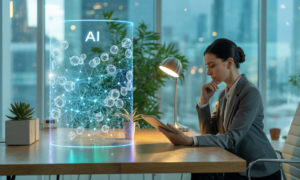What Are the Top Limitations of Artificial Intelligence?
From not being able to fully replace communication to lacking common sense and understanding things from a contextual perspective, here are 16 answers to the question, “What are the top limitations of artificial intelligence? What can’t AI do?”
- Can Never Replace Communication, Only Enhance
- Cannot Think Like a Human
- Probably Can Never Fix You a “Home-cooked” Meal
- Inability to Understand Context and Meaning
- Can’t Handle Core Tasks Like Winning Court Cases
- Can’t Create Something Completely New
- Lacks Ethical Judgment in Decision-making
- No Empathy Yet
- Does Not Possess Emotional Intelligence
- Inability to Replicate Human Creativity
- Thinking Outside of the Box
- Limited Ability to Adapt to New Situations
- Can’t Learn Beyond Given Datasets
- Expressing Someone’s Personal Experiences or Lessons Learned
- Lacks Imagination and the Personal Touch
- Limited With Common Sense and Contextual Understanding
Can Never Replace Communication, Only Enhance
AI has many uses, but one thing it should never do is replace the feeling of genuine human connection. Within the next five years, it’s highly possible that AI will mimic human responses so well that people won’t be able to tell if they’re speaking to a real person or AI. But that doesn’t mean we should rely on AI.
To find out what people really think of AI in customer service, we commissioned a massive 6,000-person survey. The results were startling. 78% of consumers said they’d prefer to speak to a person over AI, while over 35% said AI does not resolve their problems.
The survey also revealed that a third (33%) of people have been fooled into thinking they were speaking to a person only to realize it was actually a bot.
Above all, consumers want transparency; 84% said they think companies should have to disclose if they are using AI instead of real people in their customer service.
Benjamin Graham, Content Strategist, AnswerConnect
Cannot Think Like a Human
AI cannot think like a human, and therefore, it can never decide based on morality and the consideration of humankind. Big decisions made by AI that will impact a community should be double-checked by leadership to understand how it came to that decision and what effects it will have on people.
Kristine Thorndyke, Founder, Test Prep Nerds
Probably Can Never Fix You a “Home-cooked” Meal
AI would struggle to cook because it requires a combination of physical skills and sensory perception, on top of a deep understanding of ingredients, flavors, and cultural traditions.
While we can program AI to follow a recipe and execute a series of computer-like steps, it cannot taste, smell, or touch ingredients to determine if they are cooked properly. Cooking also often involves improvisation and adapting to unexpected circumstances, such as being out of an ingredient, adjusting temperature, or adding extra ingredients based on personal preference.
Without advanced robotics and the ability to physically interact with and discern food qualities, AI is unlikely to replace the touch or expertise of a chef any time soon.
Guna Kakulapati, Co-founder and CEO, CureSkin
Inability to Understand Context and Meaning
The top limitation of artificial intelligence (AI) is its inability to truly understand context and meaning as humans do. While AI can perform tasks such as recognizing patterns, making predictions, and processing large amounts of data at a speed that humans cannot match, it lacks the creativity, intuition, and emotional intelligence that humans possess.
Taimoor Hussain, Community Manager, WPExperts
Can’t Handle Core Tasks Like Winning Court Cases
We in the legal industry have been closely following the AI revolution that has everyone worried. For some of us, it’s part of our work because it affects our clientele. For the rest of us, we are simply fascinated by any rapid changes that take place in the world around us.
Frankly, it does not unnerve us. Why? Well, because we are confident that no matter how efficient AI grows to be and how expansive its adoption will be, it will never replace legal teams and win cases in court.
Now, this may seem like too vague a projection, but it pretty much sums up what AI can and cannot do. Sometimes AI can indeed transform the way we work. Even in the legal industry, AI solutions may find permanent roles where they add efficiency to some of our processes. But for core tasks and responsibilities, we humans do have the good sense and foresight to keep technology away, no matter how promising, revolutionary, or super-efficient this tech may be.
Riley Beam, Managing Attorney, Douglas R. Beam, P.A.
Can’t Create Something Completely New
Everyone is talking about AI, and how automation will replace more and more jobs, but that’s been happening for the past hundred years, and we’re all fine. Why? Because current AIs can’t create something entirely new.
AI can’t invent new things; it can only use its still limited understanding to piece together existing information. Yes, the result is nothing we’ve seen before, but if we “zoom in,” we see where the AI got its inspiration from.
Without a vast database to learn from, current AIs can’t do anything. AIs rely on existing human knowledge to create something. Will this still be true 10 years from now? Probably, but that could change in an instant if or when AIs become truly intelligent.
Ionut-Alexandru Popa, Editor-in-Chief and CEO, BinaryFork
Lacks Ethical Judgment in Decision-making
Despite advances in machine learning and natural language processing, AI still lacks the complex reasoning and judgment capabilities that we possess. For example, while we can program AI to recognize patterns and make predictions based on data, it may struggle to make sense of more abstract concepts or make nuanced decisions based on a range of factors.
Also, let’s not forget the ethical considerations when it comes to AI. While AI can be programmed to make decisions based on certain criteria, it lacks the empathy and ethical judgment of a human being. This can lead to decisions that are biased or unfair, particularly in areas like hiring, lending, and criminal justice.
Jess Rodley, Director of Operations, Dialed Labs
No Empathy Yet
AI can do a lot of things, but it’s not yet capable of empathy or the ability to feel emotion. This is one of the biggest limitations of AI, and it’s also one thing that makes humans so unique.
Empathy and the ability to feel emotion allow us to connect with each other and experience life in all its richness and variety. Without these things, life would be pretty boring—or at least it would be a very different life.
Matthew Ramirez, CEO, Paraphrase Tool
Does Not Possess Emotional Intelligence
One of the top limitations of artificial intelligence is its lack of emotional intelligence. While AI systems are becoming more advanced and can perform tasks that were once impossible, they can’t replicate human emotions or intuition.
Emotional intelligence is a crucial aspect of many human interactions, such as counseling, customer service, or negotiating. These types of interactions require empathy, intuition, and the ability to understand and respond to human emotions. While AI systems can analyze data and make predictions based on it, they can’t understand emotions or make moral judgments, which can limit their usefulness in these fields.
As someone who has worked with AI systems, I understand their limitations are an important consideration when developing and implementing them in various industries. While they can certainly be useful, they can’t fully replace human interactions.
Natalia Brzezinska, Marketing and Outreach Manager, ePassportPhoto
Inability to Replicate Human Creativity
Artificial intelligence has advanced significantly over the years. Its current capabilities are limited in several ways.
AI’s inability to imitate human creativity and intuition is one of its most significant limitations. It can produce results based on existing patterns and data, but it cannot develop original thoughts or discoveries unless specifically instructed. This inhibits its ability to solve issues that call for original or intuitive thinking.
There are several things that AI cannot accomplish in this regard. For one, it cannot entirely take the place of human judgment and decision-making. Additionally, it cannot imitate human emotions or empathy, which might be crucial in healthcare and social work.
Overall, AI has made considerable strides, but there are still numerous areas where it lags behind human intelligence and reasoning.
Peter Bryla, Community Manager, ResumeLab
Thinking Outside of the Box
One significant limitation of AI is its inability to think creatively or “outside the box.” While AI can learn from pre-fed data and previous experiences, it lacks the capacity for originality in its approach. For anything requiring an opinion, lived experience, or deep introspection, human writing will always win out.
Also, in the long term, AI applications can automate many mundane and repetitive tasks. However, if we need to use our brains less and less, will this make us lazy as a human race? I’d like to hope we continue to use our brains but on bigger and better things.
Ben Foster, CEO, The SEO Works
Limited Ability to Adapt to New Situations
In my expert opinion, AI may struggle to adapt to new situations, especially if they differ vastly from the data we have trained it on. This can limit its usefulness in areas like disaster response, where there may be unexpected variables to consider.
Daniel Close, CEO and Founder, We Buy Houses in Kentucky
Can’t Learn Beyond Given Datasets
AI is not designed to seek and learn independently. Instead, AI-powered systems only “learn” as they are programmed to learn from their developers. AI trains itself on the shared datasets, but can never move beyond those datasets without further input. That’s why ChatGPT doesn’t contain completely up-to-date information – training ceases after the development phase, so current knowledge is based on past inputs. Learning may continue afterward only as developers adjust coding and datasets accordingly.
While humans have the freedom to find alternative information and continuously learn, AI cannot.
Jeffrey Zhou, Co-founder and CEO, Fig Loans
Expressing Someone’s Personal Experiences or Lessons Learned
Artificial Intelligence (AI) is limited in expressing learnings from personal experiences. It lacks the human capacity to draw from subjective encounters and emotions. Instead, AI relies on general principles and data-driven responses, which may not always align with specific requirements.
The absence of human-like intuition and empathy limits AI’s ability to understand nuances and context, leading to potential inaccuracies or incomplete responses. While AI is valuable for data-driven tasks, it lacks the subjective understanding and personal touch that human experiences bring.
Rahul Anand, Digital Marketing Manager, GMR Web Team
Lacks Imagination and the Personal Touch
A major limitation of AI is that it cannot substitute for personal experience. It cannot write based on real-world experience and feelings. This means that AI-generated texts will lack authenticity, originality, and emotions that a reader can identify with.
While AI can copy the way people write and what they write about, it doesn’t possess the ability to create new knowledge or perspectives. Also, AI lacks the ability to understand human language’s context and complexities, such as sarcasm or irony. Therefore, automated texts may be incorrect, misleading, or not suitable for certain audiences or situations. AI is beneficial; nevertheless, it can never replace human imagination and expression.
Karl Perera, Astrophotographer and English Teacher, Astro Imagery
Limited With Common Sense and Contextual Understanding
One major limitation of artificial intelligence is that it currently lacks true common sense and understanding of context.
While AI can perform complex calculations and pattern recognition tasks, it struggles to understand and interpret information in the same way humans do. This means that AI may struggle with tasks that require reasoning, judgment, and decision-making in unfamiliar or ambiguous situations.
Additionally, AI lacks creativity and emotional intelligence, making it challenging to replicate certain aspects of human behavior and interaction. Ultimately, AI cannot fully replace the unique qualities of human intelligence, such as intuition, empathy, and subjective experience.
Yogini Kuyate, Digital Communication Strategist, DataToBiz
Related Articles
- What Are Examples of Artificial Intelligence in Healthcare?
- How expensive are self-driving cars going to be?



































